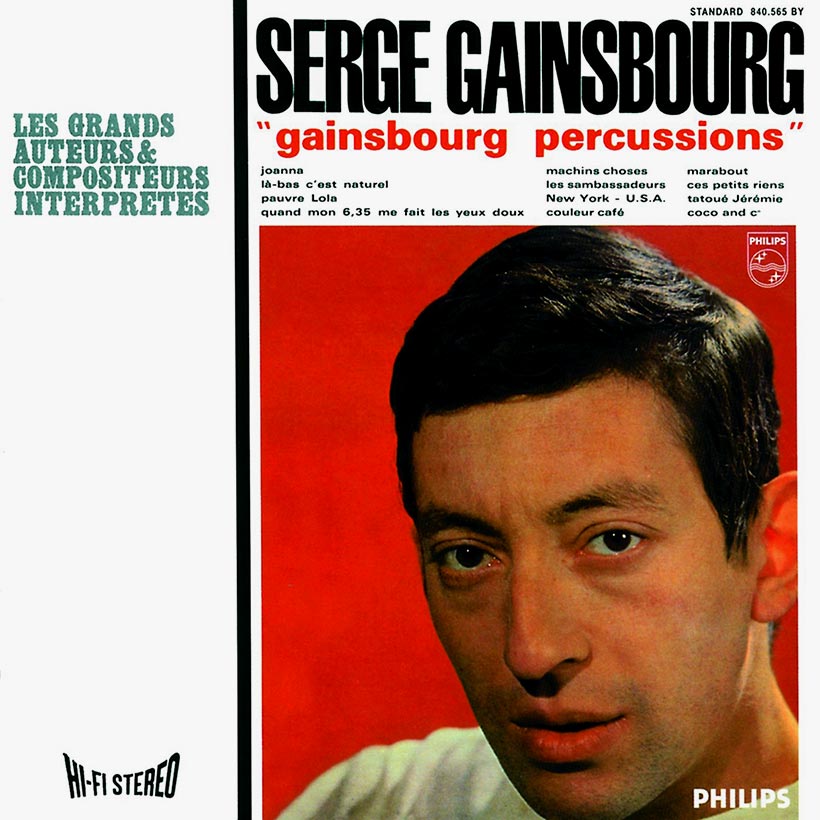‘Gainsbourg Percussions’: Serge Gainsbourg’s Rule-Breaking Afro-Cuban Jazz Album

In 1964, Serge Gainsbourg was still a little-known French jazz musician who, despite having long earned his chops in local clubs (including a stint backing Michèle Arnaud) and penned songs for Juliette Gréco (even then a living icon), was closing in on his late 30s and despairing at the lack of serious interest in the five records he’d released under his own name. So it might have been through despondency – though, just as likely, sheer audacity – that he decided to record an Afro-Latin jazz album with zero precedent in French-language music, Gainsbourg Percussions, released on October 26, 1964.
Listen to Gainsbourg Percussions on Apple Music and Spotify.
Not that Gainsbourg invented the “world music” crossover with Gainsbourg Percussions – he was coming in on the end of the exotica craze, for one – but he accomplished it with enough panache to at least make it feel as though he had. Though “Quand Mon 6,35 Me Fait Les Yeux Doux” hitched itself to Gainsbourg’s more established jazz, “Les Sambassadeurs” would have had no problem passing for the real deal at the Rio Carnival. And while Gainsbourg wasn’t prone to making overt political statements in his music, in its own (now dated) way, “Couleur Café” is a “black is beautiful” show of support for the Civil Rights Movement in the United States – particularly coming right after “New York – USA,” on which a female chorus rides the African rhythms, shadowing Gainsbourg as he reels off a litany of Big Apple landmarks.
It was all done with a distinctly Gainsbourgian shrug, making it look easy (it wasn’t: the musical arrangement on “Pauvre Lola” is exquisite; Gainsbourg’s commanding vocals ooze confidence while the laughing female on top adds a typically off-kilter element) while also caring little for propriety. Indeed, it would subsequently emerge that he had wholesale lifted the music for three Gainsbourg Percussions songs (“Joanna,” “New York – USA” and “Marabout”) from Drums Of Passion, a 1959 album by Nigerian drummer Babatunde Olatunji, and a fourth, “Pauvre Lola,” from Miriam Makeba’s “Umqokozo.”
For Gainsbourg, this particular move perhaps marked the beginning of his transformation into an iconoclastic shapeshifter. Hiding in plain sight, it now seems no less audacious than casually burning a 500 franc note live on television (as he did, in 1984), or getting France Gall to sing the innuendo-laden “Les Sucettes” in 1966 – a typically perverse way to celebrate his long-awaited mainstream acceptance.
Serge knew how to provoke people in order to promote his genius, and, in this case, the musical appropriation points both back and forward – to rock’n’roll’s African roots and Paul Simon’s later sojourn in South Africa. It also set the template for another of Gainsbourg’s controversies: getting Sly & Robbie and Rita Marley to help him turn the French national anthem into the flippantly delivered “Aux Armes Et Cætera” in 1979, simultaneously dragging reggae into the French mainstream while turning himself into a target for death threats.
Purchase Gainsbourg Percussions here.
